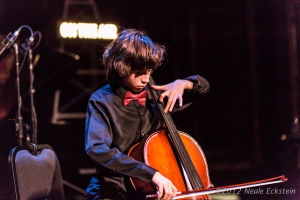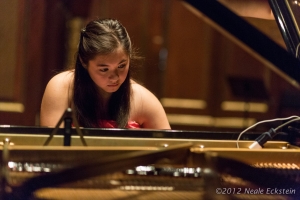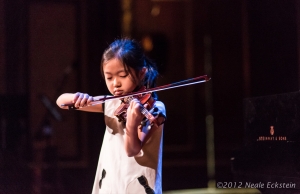Show 261: Listening Guide
From the Top’s Show 261 was taped at New England Conservatory’s Jordan Hall in Boston, Massachusetts on Sunday, October 14, 2012. We asked our performers to share their thoughts on the music they performed for the show:
Sebastian Stoger, 13, cello
“Pezzo Capriccioso”
By: Peter Ilyich Tchaikovsky
When I play this piece of music, I think about different emotions: some angry, but mostly happy. I think of the angry emotions at the introduction of the Pezzo capriccioso and the happy ones for the rest of the piece (especially the fast parts!) The first time I performed this pieced has been the first time I ever played it with the piano accompaniment. I  thought I was going to have to stop at some parts because I thought that the piano and I would have some trouble being together, but surprisingly it worked our alright.
thought I was going to have to stop at some parts because I thought that the piano and I would have some trouble being together, but surprisingly it worked our alright.
This piece of music is very special compared to other music that I’ve played. In playing this piece, it is harder to switch from different ways of playing emotions than other repertoire. Something that’s really hard to nail in this music is the last couple of fast runs in the last part of the piece. Every time I play the runs, I always get sloppy at that last part. I keep practicing that part over and over again so that the last part isn’t sloppy…yet the next day, it is sloppy again!
Post-Show Reflection: My favorite memory was the day that I performed: I was so happy to see my friends from the Perlman Music Program and my family. Since most of the lights were off in the house, the audience seemed so far away. It was only Chris and I who were together. This is a good thing, because then I didn’t have to be nervous about the audience.
Music has the power to open people’s minds, and give them a fascinating imagination. Music has the power to shape cultures, and most importantly, change people’s perspectives.
Bryan Duerfeldt, 18, recorder
When I perform this piece, I have two roles. The first is straightforward – transport my audience to a different time and place (I like to think of a dance in a royal court), and give them a sense of nobility and relaxations that they may  not always get in their busy lives. My second purpose is to expose them to the wonderful capabilities of the recorder (a widely misunderstood instrument). This piece, perhaps more than any other, allows me to show of the technical passages yet also connect emotionally with the audience, to create beautiful moments.
not always get in their busy lives. My second purpose is to expose them to the wonderful capabilities of the recorder (a widely misunderstood instrument). This piece, perhaps more than any other, allows me to show of the technical passages yet also connect emotionally with the audience, to create beautiful moments.
This is my favorite piece of music for the recorder – which is lucky, considering the countless hours I’ve spent practicing and performing it over the past couple years. There is a certain lightness that needs to come across in the fast movements, an ease of playing that cannot betray frustrating technical difficulties.
Post-Show Reflection: I loved pretty much everything Elizabeth (Aoki) did – Literally – and getting to hear everybody play at the first rehearsal. For the show, I just remember feeling comfortable and relaxed; it was just about having fun and sharing myself with my audience. Everyone was on the same team: making something beautiful together.
Music can facilitate connections between audience and performer, and break down barriers – socioeconomic, ideological, etc. It is truly universal, a pure honest medium that can promote positive change.
Vanessa Meiling Haynes, 15, piano,
III. Allegro ma non troppo – Presto from Sonata No.23 in F minor, Op. 57, “Appassionata”
By: Ludwig van Beethoven
I think the third movement of this Sonata is crazy! Literally! It was written shortly after Beethoven realized that he would never get his hearing back and would become deaf. I feel Beethoven wrote this movement when he really wanted to let his built-up emotions free, almost like he’s writing “emotions fly away, scatter on the pages!” in musical form! Playing this movement is like running through the woods and being confused where I am. The further I run the more emotional themes I face. Finally, the woods thin – the emotions start to be clearer to Beethoven, so he goes into a coda that gives a completely different theme and emotion, almost like he is wanting to forget and move on. Then he remembers again, and here comes the most exciting ending cadence, where millions of bugs each filled with emotion fly by saying, “I’M DONE, GOOD BYE!”
form! Playing this movement is like running through the woods and being confused where I am. The further I run the more emotional themes I face. Finally, the woods thin – the emotions start to be clearer to Beethoven, so he goes into a coda that gives a completely different theme and emotion, almost like he is wanting to forget and move on. Then he remembers again, and here comes the most exciting ending cadence, where millions of bugs each filled with emotion fly by saying, “I’M DONE, GOOD BYE!”
I love Beethoven, and I love all of his piano sonatas. Many, including Beethoven, and me believe the Appassionata is one of his most tempestuous sonatas. The third movement is ESPECIALLY one of the most exciting but it is also one of the most difficult to grasp that I’ve ever learned. The most difficult aspect to nail is to be able to keep the intensity and keep the emotional meaningful through ALL of those flying notes, and not allow it to get boring. It is difficult to be able to control the timing of how many of the emotions should be allowed out, and how many should be kept in, to keep it very steady, and serious.
Post-Show Reflection: The live taping was SO MUCH FUN! I loved the crowd, the audience was so cheerful and supportive. Being able to share my story on stage with Mr. O’Riley was a great feeling.
Music has a great impact – it can tell stories, it can be personal, and it can definitely be therapeutic in a way. It can be all emotions.
Elizabeth Aoki, 9, violin
“Introduction and Tarantelle,” Op.43
By: Pablo de Sarasate
 I like the piece – I don’t care for the Introduction, but really like the Tarantelle: it’s fast and exciting. To me, this piece reminds me of a fast dance. I played this piece for the United Nation’s Secretary General.
I like the piece – I don’t care for the Introduction, but really like the Tarantelle: it’s fast and exciting. To me, this piece reminds me of a fast dance. I played this piece for the United Nation’s Secretary General.
Compared to my other pieces, which are long like concertos, this piece is very short. When I’m playing, I think about intonation a lot. I hope and want to touch people’s heart though my music.
Post-Show Reflection: Everything was really fun, and the live performance was very exciting.
Music has the power to touch people’s hearts.
William Su, 18, bass/baritone
“Amor marinaro” (Sailor’s love)
By: Gaetano Donizetti
Post-Show Reflection: I had a really good time in the show and at the rehearsals – I loved the feeling of being on  that stage, and felt that the audience was very interested.
that stage, and felt that the audience was very interested.
Music can help people find out who they are.



